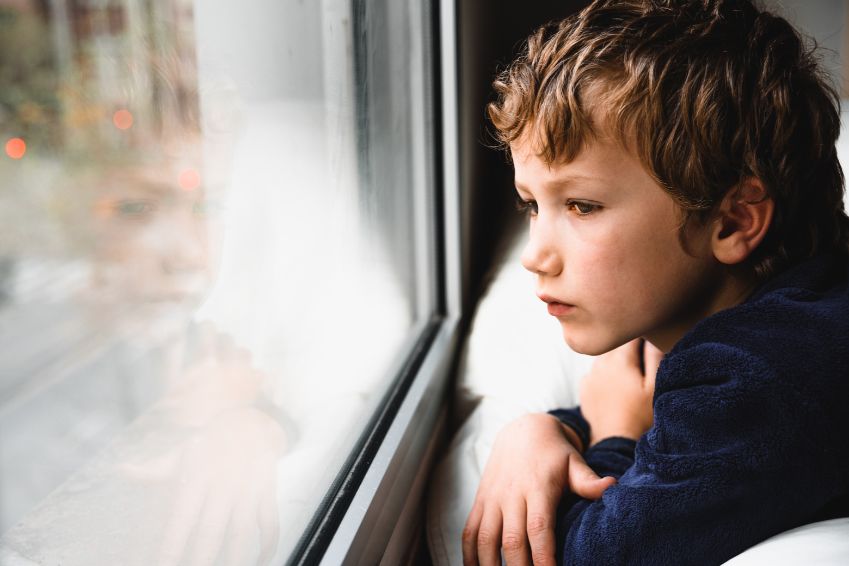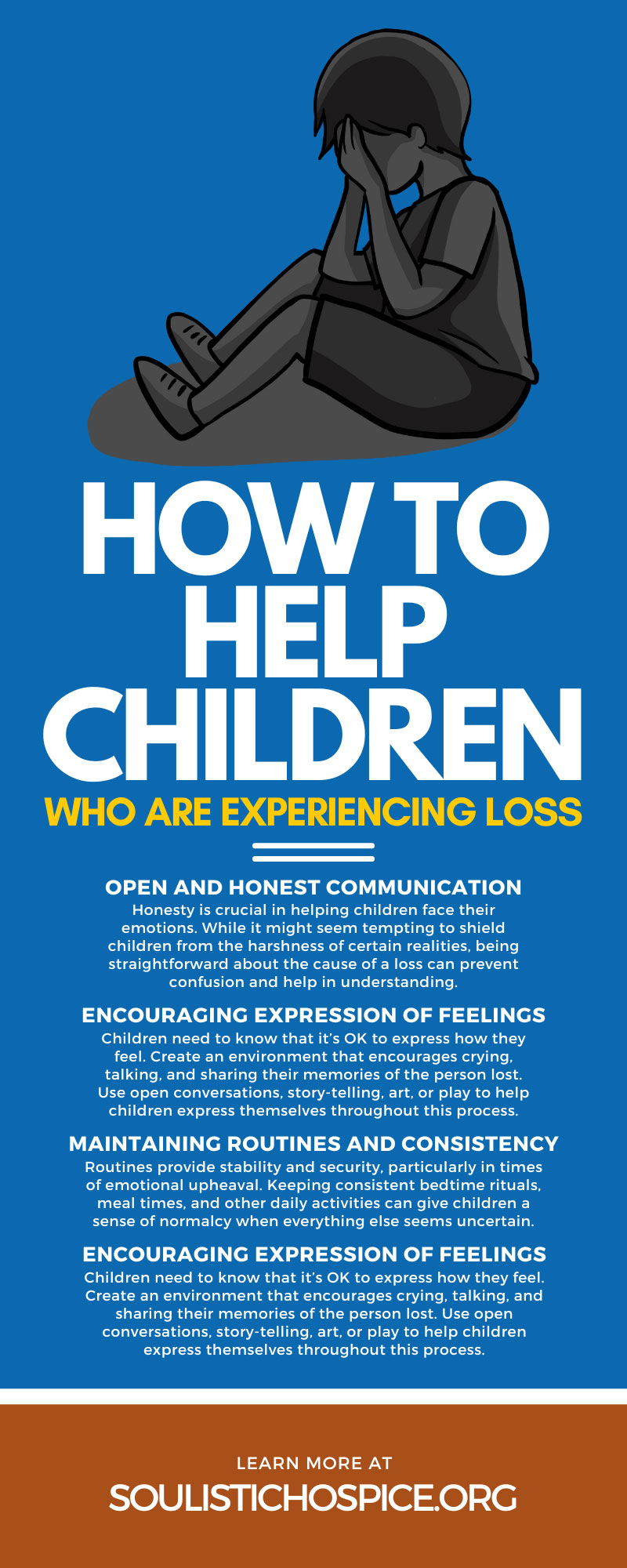
Losing a loved one is an inevitable part of life. While adults often have the tools to navigate grief, it can be an overwhelming and confusing experience for children. Parents and caregivers play a crucial role in helping children understand and process the complex emotions that come with loss. This extensive guide can provide a roadmap for adults supporting children through the difficult journey of grief. Understanding how to help children who are experiencing loss is not just about providing immediate comfort; it is about setting a foundation for future emotional health and resilience.
Understanding a Child’s Loss
To help a child cope with loss, it is critical first to understand what they are going through. Loss is a broad term; it can encompass the death of a family member or a pet, the end of a significant relationship, or any experience that involves change. Whether your child is grieving the passing of a grandparent or the shift to a new home and leaving friends behind, the principles of support remain largely the same.
Age-Appropriate Explanations
How you communicate with a child about loss can greatly impact their understanding and acceptance of the situation. Younger children, for example, might be better able to understand simpler, more concrete explanations, while adolescents might benefit from detailed discussions that cater to their more mature understanding.
- Preschoolers and Toddlers: Use simple language that they can relate to, avoiding abstract concepts. Phrases such as “passed away” might be confusing. It’s best to clarify that their person died, which means their body stopped working, and they can’t be with them anymore.
- Grade-School Aged: Children in this age range begin to understand the concept of death more clearly, although they may still be afraid of it. Reassurance can be extremely helpful.
- Adolescents: At this stage, a child’s understanding mirrors that of adults, and they may have more complicated questions. Openly discussing these questions can help them come to terms with the loss.
Common Reactions and Emotions
Children, like adults, will experience various emotions when dealing with loss. Understanding these reactions can help adults offer better support.
- Bereavement Reaction: An immediate response to loss, which may manifest as shock, fear, disbelief, or even an apparent lack of reaction.
- Grief Response: This is a more delayed reaction and typically involves a period of mourning, sadness, and emotional pain.
- Adjustment: Eventually, children will begin to adjust to life without the lost person or thing, but this doesn’t mean their grief is over. They may still have moments of sadness and miss what they’ve lost.
Creating a Supportive Environment
Creating an environment that allows children to grieve at their own pace is important. You can facilitate this in many ways, including through open communication, encouraging emotional expression, and helping maintain routines and consistency.
Open and Honest Communication
Honesty is crucial in helping children face their emotions. While it might seem tempting to shield children from the harshness of certain realities, being straightforward about the cause of a loss can prevent confusion and help in understanding.
Encouraging Expression of Feelings
Children need to know that it’s OK to express how they feel. Create an environment that encourages crying, talking, and sharing their memories of the person lost. Use open conversations, story-telling, art, or play to help children express themselves throughout this process.
Maintaining Routines and Consistency
Routines provide stability and security, particularly in times of emotional upheaval. Keeping consistent bedtime rituals, meal times, and other daily activities can give children a sense of normalcy when everything else seems uncertain.
Providing Emotional Support
Being a supportive presence is more than just being physically available. It’s about providing comfort and understanding. Understanding how to listen, validate emotions, reassure, and comfort your child during their grief journey is important.
Active Listening
Employ active listening skills to show you hear and understand what your child is going through. Give them your full attention, make eye contact, and respond empathetically.
Validating Emotions
Avoid downplaying or dismissing a child’s emotions. Instead, validate their feelings by acknowledging that it’s OK to be sad, angry, confused, or otherwise.
Offering Reassurance and Comfort
Let your child know they are safe and loved. Physical touch, such as hugs or snuggling, can be especially comforting during moments of grief. Reassure them that while life may look different, they will be OK.
Helping Children Cope
Helping children find ways to cope is an essential part of managing the impact of grief. However, it’s imperative to guide them to healthy coping mechanisms rather than unhealthy ones. Fortunately, there are many techniques you can use.
Age-Appropriate Activities and Outlets
Physical activities, creative projects, and opportunities to express themselves can be incredibly therapeutic for grieving children. Encouraging them to engage in sports, music, or other hobbies they enjoy can provide relief and distraction.
Engaging in Memory-Making
Help your child create a keepsake or memory of the person or thing lost. Consider crafting a scrapbook, planting a tree, or participating in a celebration of their life or memories.
Seeking Professional Help if Needed
If your child’s grief becomes overwhelming or if they are exhibiting changes in behavior that signal distress, seek the help of a mental health professional. It’s OK to ask for help, and therapy can be invaluable in providing tools for coping.
Supporting Family and Siblings
Grief affects the whole family, so supporting everyone involved is paramount to a healthy collective recovery. Community and togetherness are important aspects of the healing process. Therefore, you’ll want to take the necessary steps to ensure everyone feels heard and cared for.
Recognizing the Impact on the Family Unit
Loss doesn’t just affect the individual; it impacts family dynamics and relationships. Understanding these shifts can help everyone in the family navigate the changes more effectively.
Encouraging Open Dialogue
Openness within the family can allow everyone to share their feelings and experiences. Regular family meetings or check-ins can ensure each member has the support they need.
Providing Resources and Support Networks
Use community grief networks and support groups that cater to children and their unique experiences with loss. These resources offer a space for sharing and learning from others coping with similar situations.
The journey through loss and grief is unique for everyone—children especially. But with the right support, children can learn to navigate complex emotions, gain a greater sense of self, and develop a deeper understanding of the importance of relationships in life. This guide to helping children cope with loss is just the beginning. Contact Soulistic Hospice today to learn about our grief counseling in AZ. Lean on the support networks available to you, from friends and family to professionals, and know that you are not alone as you help your child through loss.









